

Reflective thinking and writing: Schön's model. The 3 minute Kolb. Four Lenses: Evaluation Resources - Teaching and Learning. The Faculty of Arts and Social Sciences encourages its teachers to engage in critical reflection on evidence about teaching and students' learning and to read the Faculty of Arts and Social Sciences Evaluation of Teaching Policy.
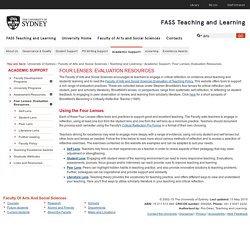
This website offers tools to support a rich range of evaluation practices. These are collected below under Stephen Brookfield's four lenses for critical reflection (self, student, peer and scholarly literature). Brookfield's lenses, or perspectives, range from systematic self-reflection, to reflecting on student feedback, to engaging in peer observation or review, and learning from scholarly literature. Reflective Practice - Tools. Pages in this section: | Starting | Moving on | Tools | Videos 1 | Videos 2 | Videos 3 | Videos 4 | Videos 5 | Tools for Reflection - online and other tools to help reflection Activities available for download Generic visualisation activity - download You can use: Flip charts and pens Old fashioned Over Head Transaparancies (OHTs) - use up the ones you still have laying around!
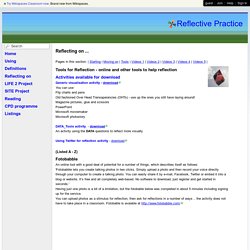
Magazine pictures, glue and scissors PowerPoint Microsoft moviemaker Microsoft photostoryDATA_Tools activity. - download An activity using the DATA questions to reflect more visuallyUsing Twitter for reflection activity - download (Listed A - Z) Fotobabble An online tool with a good deal of potential for a number of things, which describes itself as follows: 'Fotobabble lets you create talking photos in two clicks. Article from an enthusiast at: Another item with some cautions about the openness of the sharing of images Mind Mapping. Kolb's Learning Cycle.
David Kolb proposed a 4-stage experiential learning cycle that applies to all learners.
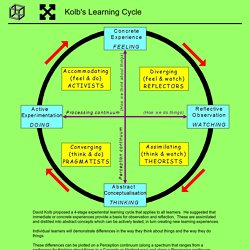
He suggested that immediate or concrete experiences provide a basis for observation and reflection. These are assimilated and distilled into abstract concepts which can be actively tested, in turn creating new learning experiences. Individual learners will demonstrate differences in the way they think about things and the way they do things. Kolb Learning Cycle Tutorial - Static Version. Text and concept by Clara Davies (SDDU, University of Leeds) Tutorial design by Tony Lowe (LDU, UNversity of Leeds) Multimedia version (Flash plug-in required).
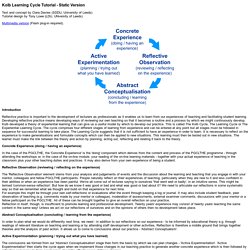
Introduction Reflective practice is important to the development of lecturers as professionals as it enables us to learn from our experiences of teaching and facilitating student learning. Developing reflective practice means developing ways of reviewing our own teaching so that it becomes a routine and a process by which we might continuously develop. Kolb developed a theory of experiential learning that can give us a useful model by which to develop our practice.
Concrete Experience (doing / having an experience) Four Lenses: Evaluation Resources - Teaching and Learning. Mike the Mentor - Classic Models. The GROW Model is deservedly one of the best known and widely used coaching models.
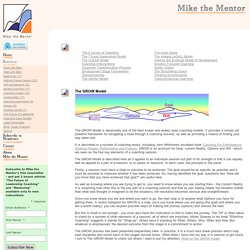
It provides a simple yet powerful framework for navigating a route through a coaching session, as well as providing a means of finding your way when lost. It is described in a number of coaching books, including John Whitmore's excellent book Coaching For Performance: Growing People, Performance and Purpose . GROW is an acronym for Goal, current Reality, Options and Will - which are seen as the four key elements of a coaching session. The GROW Model is described here as it applies to an individual session but part of its strength is that it can equally well be applied to a part of a session, or to series of sessions. Firstly, a session must have a Goal or outcome to be achieved. As well as knowing where you are trying to get to, you need to know where you are starting from - the Current Reality.
But this in itself is not enough - you must also have the motivation or Will to make the journey. Gibbs' Reflective Cycle - Helping People Learn From Experience. Helping People Learn From Experience Use this simple tool to encourage your team members to reflect on their experiences. © iStockphoto/ermingut Many people find that they learn best from experience.
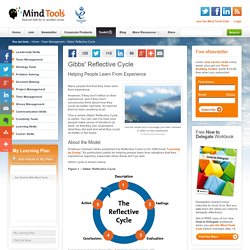
However, if they don't reflect on their experience, and if they don't consciously think about how they could do better next time, it's hard for them to learn anything at all. This is where Gibbs' Reflective Cycle is useful. About the Model Professor Graham Gibbs published his Reflective Cycle in his 1988 book "Learning by Doing. " Gibbs' cycle is shown below. Donald Schon (Schön): learning, reflection and change.
Contents: introduction · donald schon · public and private learning and the learning society · double-loop learning · the reflective practitioner – reflection-in- and –on-action · conclusion · further reading and references · links · how to cite this article Note: I have used Donald Schon rather than Donald Schön (which is the correct spelling) as English language web search engines (and those using them!)
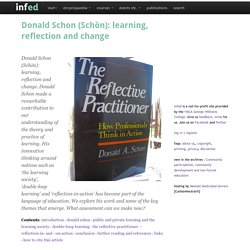
Often have difficulties with umlauts). Donald Alan Schon (1930-1997) trained as a philosopher, but it was his concern with the development of reflective practice and learning systems within organizations and communities for which he is remembered. Significantly, he was also an accomplished pianist and clarinettist – playing in both jazz and chamber groups. This interest in improvisation and structure was mirrored in his academic writing, most notably in his exploration of professional’s ability to ‘think on their feet’. Critical Incident Questionnaire. Downloads - Phil Race Phil Race.
Experiential Learning.